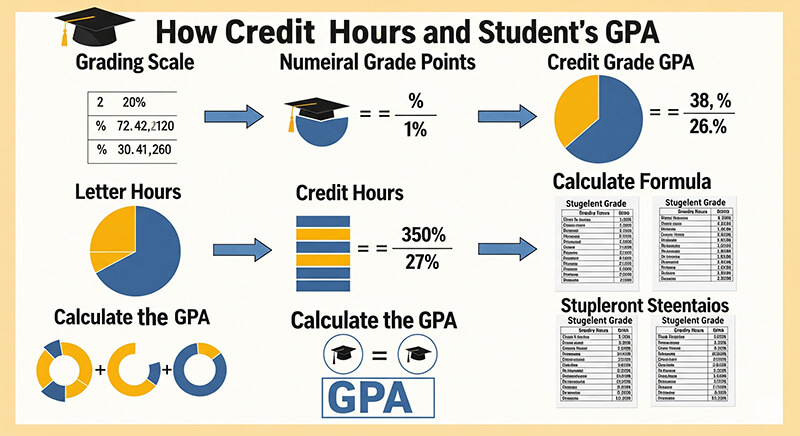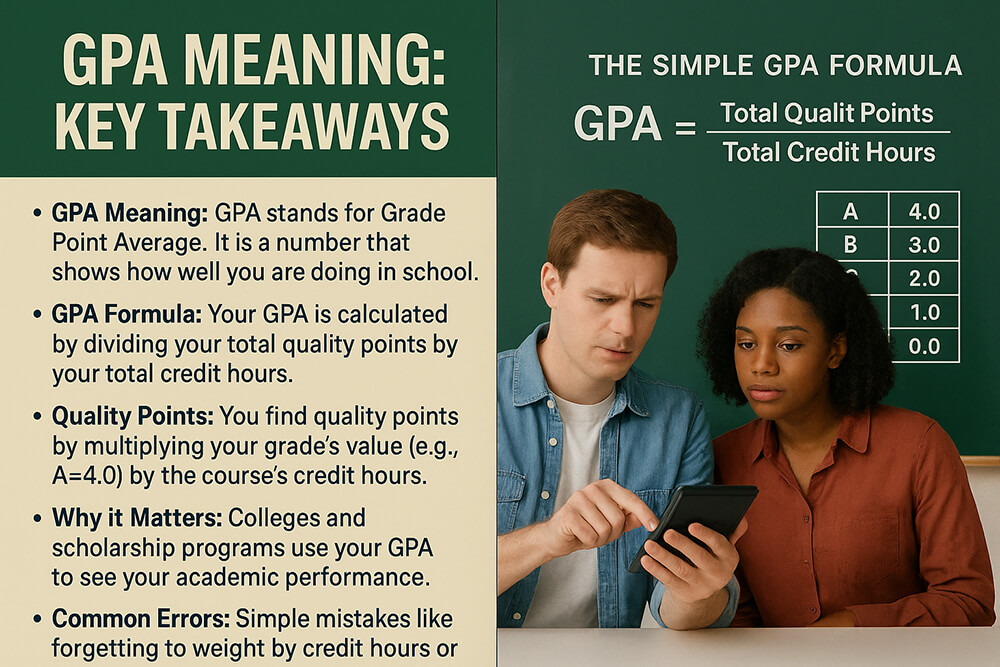Prerequisite-Only GPA Calculator: Focusing on What Matters
A prerequisite-only GPA calculator helps you see your grades for just the courses needed for your major. This tool gives you a clear picture of your academic standing for specific programs. It removes grades from classes that are not part of your core study path.
| Key Takeaway | Description |
|---|---|
| Clear Focus | A prerequisite-only GPA calculator shows your performance in the most important courses for your major or professional program. |
| Application Readiness | It helps you know if you are ready to apply for advanced programs like medical, business, or engineering school. |
| Strategic Planning | The tool lets you see weak spots in your prerequisite courses early, so you have time to improve. |
| Why It's Important | Many programs, like medical schools, look at your prerequisite GPA more closely than your overall GPA. |
What Is a Prerequisite-Only GPA Calculator?
A prerequisite-only GPA calculator is a special tool. It helps students figure out their Grade Point Average (GPA) using only the classes required for their specific program. This is different from a regular GPA calculator, which uses all of your grades. This tool filters out electives and other general classes. It gives you a GPA that shows how well you are doing in the subjects that matter most for your future career. You can learn the basics of how to calculate your GPA to understand how these calculators work. A good online tool like The GPA Calculator can simplify this process.
Why Your Prerequisite GPA Matters More
Your prerequisite GPA is very important for many professional programs. Medical schools, for example, look closely at your grades in biology, chemistry, physics, and math (BCPM). The average BCPM GPA for students getting into MD programs is around 3.73. This shows that schools want to see strong performance in these key subjects. A high prerequisite GPA tells admissions officers that you can handle the hard coursework in their program. Using a college GPA calculator can help you track these specific grades. For students in multiple fields, a dual-degree GPA splitter can also be very useful.
Understanding the Basic GPA Formula
The GPA formula is simple. Each grade you get is worth a certain number of points. An A is usually 4 points, a B is 3, and so on. You multiply the grade points for each class by the number of credit hours for that class. This gives you the quality points for each course. Then, you add up all the quality points and divide by the total number of credit hours. A GPA formula guide can walk you through the steps. Understanding the difference between quality points vs. GPA is key to seeing how your final score is created.
How Letter Grades and Credits Affect Your GPA
Your final GPA depends on two main things: your letter grades and the credit hours for each class. A good grade in a class with more credit hours will help your GPA more than a good grade in a class with fewer credits. For example, an A in a 4-credit science lab will boost your GPA more than an A in a 1-credit gym class. A letter to point GPA conversion guide shows you how each grade translates to points. It is also helpful to read a credit hour weighting GPA guide to see how credits impact your score.
Handling Weighted vs. Unweighted Grades
Some high schools use weighted GPAs to give more value to harder classes, like Honors or Advanced Placement (AP) courses. In a weighted system, an A in an AP class might be worth 5.0 points instead of the usual 4.0. This rewards students for taking on more challenging work. An unweighted GPA treats all classes the same. It is important to know which system your school uses. You can explore the difference between weighted vs. unweighted GPA to learn more. A GPA weighting guide for Honors and AP can clear up confusion, and it is useful to be aware of common weighted GPA myths that have been debunked.
Special Cases: Pass/Fail, Incompletes, and Transfers
Some situations can make GPA calculations tricky. Pass/fail classes, for example, usually do not affect your GPA. Transfer credits from another school might be handled differently depending on the new school's rules. An incomplete grade is temporary and needs a plan to be resolved. Learning how pass/fail grades impact your GPA is important for making smart course choices. If you have an incomplete grade, a guide on GPA planning for incomplete grades or an incomplete grades scenario planner can help. A transfer credits GPA integrator is a useful tool for students changing schools.
Calculating GPA Across Different School Systems
GPA calculation can change based on the school system. Some high schools use a 4.0 scale, while others might use a 5.0 GPA scale guide. Some colleges operate on a trimester system, which requires a trimester GPA calculator. International Baccalaureate (IB) programs also have their own way of converting scores, and an IB to GPA conversion guide can be helpful. A high school GPA calculator is a great tool for younger students. It is also good to understand how school districts calculate GPA to be fully informed.
Tools for Tracking and Planning Your Prerequisite GPA
Staying on top of your prerequisite GPA is easier with the right tools. A semester GPA calculator lets you check your performance each term. Over time, you can use a cumulative GPA calculator to see your overall progress. For a visual look at your grades, a GPA trend graph generator can show if you are improving. If you have many semesters of grades, a multi-semester GPA bulk import tool saves you time by letting you upload everything at once.
Strategies to Improve Your Prerequisite GPA
If your prerequisite GPA is not where you want it to be, you have options. One common strategy is to retake a course to get a better grade. A repeat course GPA recalculator can show you how a new grade will change your GPA. Some programs allow you to exclude your worst grade, and a drop lowest grade analyzer helps you see the impact. For some applications, your most recent grades are more important. In that case, a last 60 credits GPA calculator can be very useful for focusing on your recent performance.
Avoid These Common GPA Calculation Errors
It is easy to make mistakes when calculating your GPA. A frequent error is not using the correct number of credit hours for each course. Another is using the wrong grade points for plus or minus grades. To ensure your numbers are correct, it is wise to double-check your work. Following a guide on common GPA calculation errors to avoid can help you prevent these mistakes. Performing a regular transcript GPA audit guide is another good practice to catch any issues early.
Frequently Asked Questions (FAQ)
What courses count as prerequisites? Prerequisite courses are the specific classes required for admission into a particular program. For pre-med students, this typically includes biology, chemistry, physics, and math (BCPM). For business majors, it might be economics, accounting, and statistics.
How is prerequisite GPA different from my overall GPA? Your prerequisite GPA is calculated using only the grades from your required prerequisite courses. Your overall GPA includes grades from all courses you have taken, including electives and general education classes.
Can I calculate my prerequisite GPA for multiple programs? Yes, you can. Different programs may have different prerequisite course lists. A tool like a dual-degree GPA splitter can help you calculate separate GPAs for each program you are interested in.
What is a good prerequisite GPA for medical school? To be a competitive applicant for most medical schools, you should aim for a prerequisite (BCPM) GPA of 3.7 or higher. The average for students who successfully matriculate is around 3.73.
Where can I find a reliable prerequisite-only GPA calculator? A reliable and easy-to-use tool can be found at www.thegpacalculator.com. It offers various calculators to help you manage your academic progress effectively.










